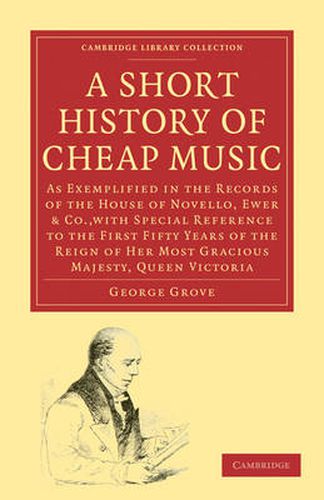Readings Newsletter
Become a Readings Member to make your shopping experience even easier.
Sign in or sign up for free!
You’re not far away from qualifying for FREE standard shipping within Australia
You’ve qualified for FREE standard shipping within Australia
The cart is loading…






The publisher Novello was hugely influential in making music affordable for a wider section of the Victorian public. A Short History of Cheap Music, published in 1887, focuses on Novello’s role. It begins with the establishment of the house in 1811, when the founder, Vincent Novello, printed his first book at his own personal expense. Soon afterwards the house made available cheap editions of major musical compositions including Mozart’s and Haydn’s masses, Purcell’s sacred music, and various Italian and English works. It also printed a variety of publications and journals dedicated to music, advocated the reduction of taxes on music, and organised events for the advancement of the musical arts. The author shows how by finding cheaper methods for printing music, organising cheap concerts, and establishing new choral societies, the house of Novello gradually created a taste for music among new audiences, a process paralleled today in the new media.
$9.00 standard shipping within Australia
FREE standard shipping within Australia for orders over $100.00
Express & International shipping calculated at checkout
The publisher Novello was hugely influential in making music affordable for a wider section of the Victorian public. A Short History of Cheap Music, published in 1887, focuses on Novello’s role. It begins with the establishment of the house in 1811, when the founder, Vincent Novello, printed his first book at his own personal expense. Soon afterwards the house made available cheap editions of major musical compositions including Mozart’s and Haydn’s masses, Purcell’s sacred music, and various Italian and English works. It also printed a variety of publications and journals dedicated to music, advocated the reduction of taxes on music, and organised events for the advancement of the musical arts. The author shows how by finding cheaper methods for printing music, organising cheap concerts, and establishing new choral societies, the house of Novello gradually created a taste for music among new audiences, a process paralleled today in the new media.